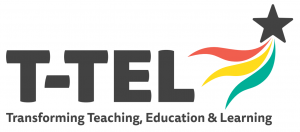
Students from A.M.E Zion SHS and University of Education Winneba gather in a classroom, ready to learn how to make low-cost and no-cost science experiments
February 11 marks International Day of Women and Girls in Science (IDWGIS), a significant occasion recognized by the United Nations to highlight the importance of gender equality in the field of science. This annual observance serves as an opportunity to celebrate the contributions of women in science and to encourage young girls to explore opportunities in STEM fields. This year’s theme, “Women and Girls in Science Leadership – a New Era for Sustainability,” emphasizes the significant role of female representation in driving sustainable development through science.
To mark IDWGIS, Transforming Teaching, Education, and Learning (T-TEL) collaborated with the French Ambassador for Europe’s two largest science teaching networks – Science on Stage and Scientix – Michael Gregory to share hands-on science with teachers across senior high schools. Michael supports teachers and learners to conduct low-cost science experiments to make science lessons engaging, exciting, and effective.
He was supported by Mr. Emmanuel Annan, Coordinator for the Resource Centre at Accra College of Education. They visited A.M.E Zion Girls’ Senior High School to spend some time teaching Form 3 female students how to perform Michael’s newest show “Particle Detectives” (www.scienceonstage.fr/particle-detectives), which he developed for CERN – the European Organization for Particle Physics.
Wednesday started with Michael performing Particle Detectives for an audience of approximately 25 Form 3 students, 5 teachers and 13 student teachers from nearby University of Education, Winneba. Following the performance, students were divided into groups to specialise in one of the experiments which they would perform the next day to basic school learners. The rest of the day was spent testing out the experiments, advancing their understanding, and practicing to be ready for their performances the next day.

Michael Gregory conducting science experiments at A.M.E Zion Girls SHS
Thursday started with the 25 Form 3 students performing for an audience of over 50 Form 3 students. After a brief debrief, Michael, Emmanuel and the students headed to the A.M.E Zion Basic School where they had another performance for over 50 Primary 6 students.
The following science experiments were done:
1 – Paper Race
2 – Bernoulli Effect
3 – Air Vortex
4 – Coloured Fluorescence
5 – Hoop Glider
Experiment 1: Paper Race |
Instructions:
|
Experiment 2: Bernoulli Circus |
Instructions: A – Bernoulli Effect with Paper
B – Coanda Effect with Balloon
|
Experiment 3: Air Vortex |
Instructions:
|
Experiment 4: Coloured Florescence |
Instructions:
|
Experiment 5: Hoop Glider |
Instructions:
|
Box text on experiments is based on the Particle Detectives experiment guide, published by CERN here: https://zenodo.org/records/10611185
The approach of training SHS students to conduct the experiments at the basic school was to offer the young learners relatable role models from their immediate surroundings and also facilitate effective communication between the SHS students and their primary school counterparts. The SHS students were able to communicate effectively with the primary school students, even using the local language where necessary.

A.M.E Zion Girls students conducting science experiment in a basic school
“This was a really special event for me – I’ve performed experiments at countless schools, but this event combined several ideas I’ve been working on for years. I’ve had various science clubs based on the model of students teaching students, and even inspired many new science clubs here in Ghana, notably through my YES! International network. Using science performance to make cutting-edge research more accessible was a key part of the PERFORM project I worked on as a UNESCO volunteer in 2019” said Michael Gregory.
“As you may have noticed, young kids (and even some adults) can have a very hard time understanding foreign accents here in Ghana. Teaching older students to perform a science show for younger students provides an innovative way for my ideas to be shared with the younger ones in a more accessible and relatable way.
Targeting girls was the last piece of the puzzle to come into place. The idea started when I was speaking to people at the International Particle Physics Outreach Group. They run a series of Masterclasses, and the past couple years have started off their season with girls-only masterclasses, led by female scientists, around the International Day of Girls and Women in Science. At first glance, it seems like a great idea, but the more people I talked to, the more I learned about places where this actually compounds the problem of underrepresentation of females in subsequent masterclasses, because both scientists and students who have already completed the girls’ masterclass are less likely to attend the mixed classes covering the same material later on. I sought to create an alternative – instead of simply segregating and running the same program, creating something different, which can ideally increase, rather than decrease, girls’ interest in participating in other programing. Teaching them to perform Particle Detectives seems to do just the trick!”

